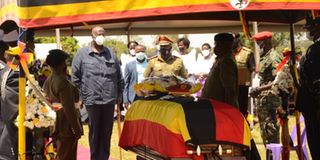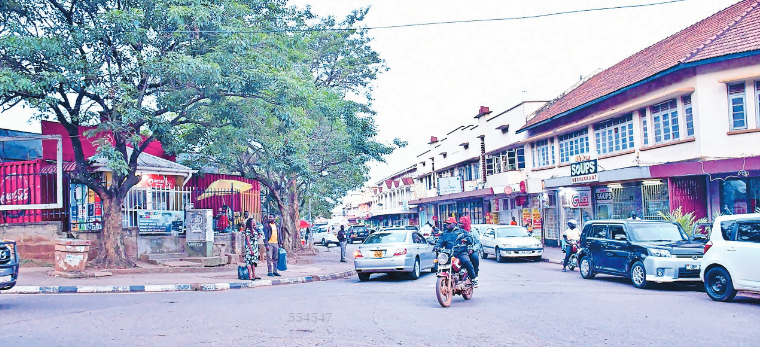Prime
Acholi leaders task govt to probe Lokech death

Operation Wealth Creation coordinator Gen Caleb Akandwanaho, alias Salim Saleh (2nd left) pays his last respects to Lt Gen Paul Lokech during the former Deputy IGP’s send off at his home in Pader District yesterday. PHOTO/TOBBIAS JOLLY OWINY.
What you need to know:
The leaders say government owes it to the people to exhaustively answer their doubts about what led to the sudden death of the Deputy Inspector General of Police.
Chief Justice Alfonse Owiny-Dollo yesterday joined the chorus of voices to task government to undertake a wider and deeper inquiry into the sudden death of the Deputy Inspector General of Police, Lt Gen Paul Lokech.
The calls come a week after pathologists concluded that Lt Gen Lokech had succumbed to blood clots in his lungs.
Justice Owiny-Dollo said the government owed it to the people to exhaustively answer their doubts about what had led to the sudden death of the general.
The Chief Justice said the inquiry should look into all possible causes of death, including at his place of work, where he could have had some conflict with interested parties in the line of his duty.
But Justice Owiny-Dollo also quickly counselled that the community should respect the privacy and wishes of the family and leave it to them to decide the best course of action in the matter.
Several local leaders, one after another, have raised questions as to what could have caused the death of the fearless and ever combat-ready general, who had fought fierce battles in and outside Uganda, including in South Sudan, DR Congo, and the restive Somalia, where he battled militant Islamists, the al-Shabaab.
The funeral service for Lt Gen Lokech, led by former Archbishop Henry Luke Luke Orombi of the Church of Uganda, had started calmly at Paipir Primary School playground, Pader District, at exactly 10am.
But speeches turned fiery when Mr Ricky Anywar, the Agago West County MP, rose to speak and challenged government to explain clearly what caused the death of Lt Gen Lokech.
Mr Anywar, who represented the Acholi Parliamentary Group (APG) chairperson Anthony Akol, said explanations by government, police and the army were creating more suspicion among the Acholi people, who think the army general may have been ‘killed’.
“Come out clearly and tell us what killed him. His death may unite us now, but how he died has raised more questions among us and our people than the answers available,” Mr Anywar said.
Mr Okin Ojara, the Chua West MP and former APG chairperson, said government must investigate Gen Lokech’s death further and let the Acholi people know to avoid a situations of mistrust in government.
“Hi death must be investigated further beyond the ‘blood clot theory’ that police and the army is telling us now and the feedback be given clearly to Acholi people as Ugandans,” he challenged.
“We ask government that an end must be brought to deaths that someone collapses at once under unclear circumstances must stop, we need to rest from this idiocy,” he added.
But Mr Jacob Oulanyah, the Speaker of Parliament, challenged the doctors and the family doctor to explain to mourners how a simple crack in Gen Lokech’s bone would later result in a clot that claimed his life.
“We want to listen to it and be satisfied, it will not bring him back to life, but we want to be satisfied on how exactly that came about,” Mr Oulanyah said.
But Maj Gen Kahinda Otafiire, the Internal Affairs minister, who represented President Museveni at the funeral, said it was disastrous to make the matter political as Acholi leaders portrayed it.
“Countrymen, much as we are entitled to be inquisitive about unknown phenomenon, let’s be philosophical about our approach to life. Uganda was here without us, Uganda was here with us and Uganda will be here long after we are gone,” Gen Otaffire said.
Despite the demands of the Acholi leaders, in his speech, Gen Otafiire said government would not wish to delve much into the circumstances surrounding the death of Gen Lokech since it is a private matter.
“I want to put to you that a postmortem was done and a postmortem report was handed over to the family, and I am not at liberty to disclose that report unless I have the permission of his family and the police,” he said.
Gen Otafiire asked the police to consult with the family and make public the report of the fallen general’s postmortem.
“I would like the police together with the family to put this report at the disposal of the public because people want to know what the legitimate cause of Gen Lokech’s death is and the case is put to rest,” he added.
Gen Otafiire expressed disappointment in the utterances of Acholi leaders, saying their demands were political and meant to cause panic in the public.
“Why did we invest in them, why did we invest in getting many Acholi sons and daughters into powerful positions in government and at the end kill them? Who do you think will protect me when tomorrow, I am no longer the minister of Internal Affairs? The people I don’t know or the people I have raised?”
“I can’t say there might not be people or a group of people who want to replace them and, therefore, would be interested in destroying them, but I’m saying those of us who raised them would not be the same people to destroy them,” he said.
President Museveni, in his speech, said: “Given Lt Gen Lokech’s exemplary contribution for the last 30 years in the armed forces, I hereby...promote Major General Paul Lokech, posthumously, to the rank of Lieutenant General.”
Ricky Anywar (Agago West MP)
[Government should] come out clearly and tell us what killed him. His death may unite us now, but how he died has raised more questions among us and our people than the answers available.
Okin Ojara (Chua West MP)
His [Lt Gen Lokech’s] death must be investigated further beyond the ‘blood clot theory’ that police and the army is telling us now and the feedback be given clearly to Acholi people as Ugandans.
Jacob Oulanyah (Speaker of Parliament)
...it sounded reckless that government came to publicly claim that the deceased died of a clot due to a fracture he had earlier on even when he was already recovering.
Alfonse Owiny-Dollo (Chief Justice)
...the inquiry should look into all possible causes of death, including at his place of work, where he could have had some conflict with interested parties in the line of his duty.
Maj Gen Kahinda Otafiire (Internal Affairs minister)
...a postmortem was done and a report was handed over to the family, and I am not at liberty to disclose that report unless I have the permission of his family and the police.
Postmortem
Police statement on postmortem
“…..We want to further inform the public that a postmortem examination was carried out on the body of the deceased, by a team of four pathologists.
Also present were Brig Gen Dr Stephen Kusasira, the Director of Medical Services in the UPDF, the personal doctor of the late, Dr Ben Khiingi, and two family representatives.
The team of pathologists established that the victim got a fracture of the right ankle joint, around the end of July.
It was a simple fracture which was being managed at Ruby Medical Centre, by an orthopedic surgeon. They put a POP cast at the victim’s leg and managed him as an outpatient, with regular reviews. They further encouraged him to do mild exercises while at home.
It was further established that the pain in the right leg started increasing in the last two to three days, and the victim notified his orthopedic surgeon, who scheduled an appointment for him on the August 21, at around 8.30am and 900am.
Indeed at around 7.54, the victim called the orthopedic surgeon to reconfirm their appointment.
It is unfortunate that shortly after, the victim started facing breathing problems and called his personal doctor, Ben Khiingi, who rushed to the home, but found the victim breathing his last and died.
During the autopsy, the pathologists opened the right lower leg, which got injured, and found a very big blood clot that had formed in one of the big blood vessels. They further opened his chest and found part of the blood clot had been carried into the lungs.
As a result, both vessels in the lungs were blocked, thus leading to the shortage in breath and subsequent death. It was thus concluded as death due to natural causes.”
Fred Enanga



